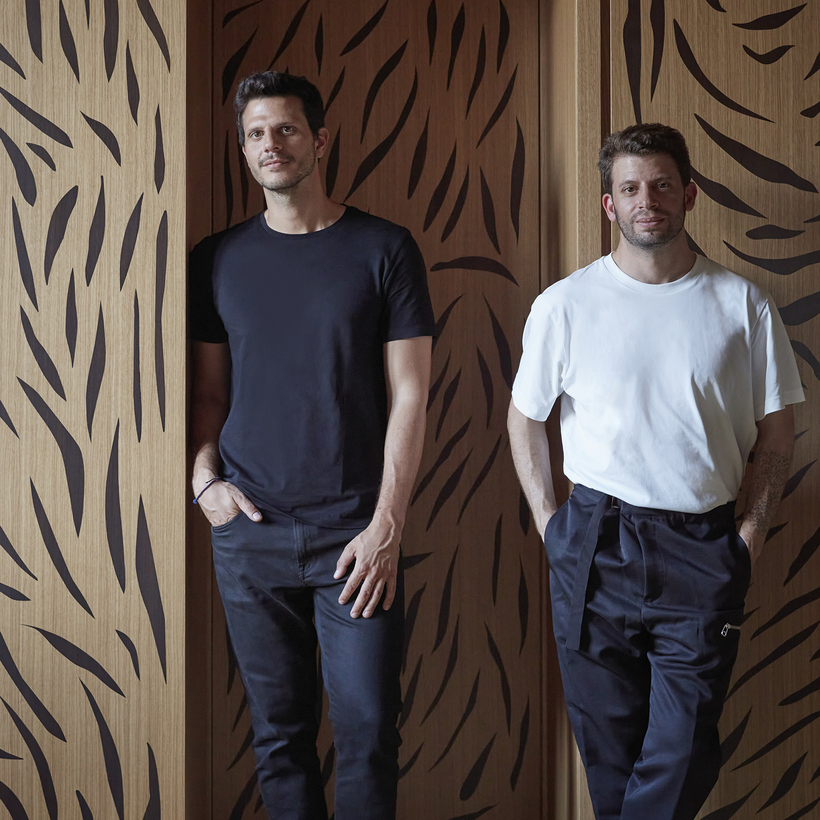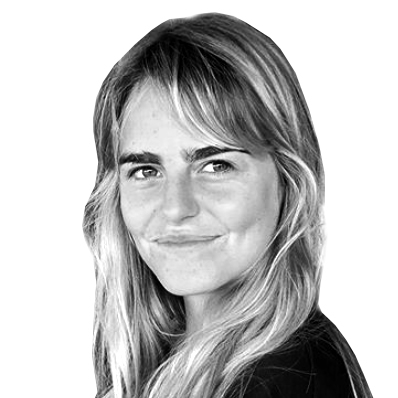Designers David Raffoul and Nicolas Moussallem first met in 2006, at the McDonald’s across the street from the Académie Libanaise des Beaux-Arts, in Beirut, where they were design students. At the time, they couldn’t have imagined that by their early 30s they would redesign the Casa di Fantasia, the Surrealist Milanese apartment that famed architect Gio Ponti created for the Lucano family in 1951.
Since the duo started their design studio, David/Nicolas, in 2011, they’ve been busy. In 2014, when they were just 26, The New York Times named them Milan Design Week’s breakout stars. Today, at 35, they’re represented by the cutting-edge Carpenters Workshop Gallery. They’ve also exhibited furniture at the Park Avenue Armory and designed Moooi carpets, plasterwork for CC-Tapis, and dinnerware for Vista Alegre.

Next week, they’re displaying Orient Sofa, a retro-yet-futuristic sofa modular system, at Nilufar Gallery’s “The Bright Side of Design” show. It’s part of Milan’s Salone del Mobile, the world’s premiere furniture fair. I visited Moussallem in their Milan studio, where the company has been partly based since 2020. It’s a sleek, elegant space filled with natural light and their custom-made tables and chairs.
Raffoul joined via FaceTime from their other studio, in Beirut, where they were both born and raised. They recently rebuilt the space after the 2020 explosion at a nearby port, which killed more than 200 people and displaced upwards of 300,000, destroyed it.

“We were 200 meters from the blast, so everything, and I mean everything, was destroyed,” Raffoul says. When the explosion happened, they were working in the studio. “It’s a miracle we’re still alive.”
Despite the catastrophe’s upheaval of their professional and personal lives, the pair has remained very much in sync. After meeting, they quickly became friends and informal design partners. During university, “I used to take his drawings, because I don’t know how to sketch, and copy them,” Moussallem says. “I used to get better grades than him sometimes, which used to piss him off.”

After graduating from Académie Libanaise des Beaux-Arts, in 2009, both enrolled at Milan’s Polytechnic School of Design, one of Europe’s most prestigious design institutions. In 2011, when it was time to create their final projects, they approached it together. “He sketches, and I narrate the larger concept. That’s how we work,” Moussallem explains.
Next, they embarked on separate, short-lived internships. Moussallem went freelance while Raffoul did a creative residency at Fabrica, in Italy. A year later, they moved back to Lebanon and started their studio.

Their rise was quick. In 2013, when Nilufar Gallery was hosting a pop-up show in Beirut, Raffoul and Moussallem reached out to them requesting an invitation. They got an unexpected reply: “You’re designers? Why don’t you send us a portfolio of your work?”
On opening night, the pair brought their portfolios, only to discover they’d been left off the list. After showing the doorman e-mail proof of their correspondence with the gallery, they were let through. Eventually, they found Nina Yashar, Nilufar’s owner. “She flips through and sees our Daulita chairs. All of a sudden she’s like, ‘I want to develop a collection with you,’” says Raffoul. “I flew with a prototype all the way to Milan and ran to her studio in the rain. We’ve been working together ever since.”

By 2014, they had made their debut with Nilufar at Salone del Mobile with the Daulita chair, which has a sleek, elegant metal frame and jewel-toned upholstery. Later that same year, they hosted “Loulou / Hoda,” their first solo show, which was inspired by their grandmothers’ blending of Eastern and Western traditions. After earning high-profile awards, including the Red Dot Design Award and the Wallpaper Design Award, they piqued the interest of Carpenters Workshop Gallery, which reached out to them for custom-made cabinets.
In 2018, their solo exhibition “Supernova,” which went on view at Carpenters Workshop Gallery’s New York location, made waves in the design world. To make pieces for the show—including marble tables with missing chunks, which they call “constellations”—“we reimagined the explosion of a star and how this death can create new life,” Raffoul explains. “It’s also inspired by Beirut, which at that time had been burned seven times. Though now [with the 2020 blast] it’s been burned eight.”

The blast that shook Lebanon happened around the time they’d started work on Casa di Fantasia. Although “it was a moment of extreme stress,” Mousssallem says, they completed the project, which included installing new boiseries, bookshelves, and furniture in the apartment.
After Design Week and the Nilufar show, they have countless projects on the horizon, including several custom boiseries, which they think could become their trademark. “After calamity, some people sit back and think about what happened and stop growing,” Raffoul says. “But we’re of the philosophy that you can grow from something like that, and become a better person. After all, we think that’s what our city needs.”
“The Bright Side of Design” will be on at Nilufar Gallery, in Milan, beginning April 18
Milan’s Salone del Mobile will be on from April 18 through April 23
Elena Clavarino is the Senior Editor for AIR MAIL

